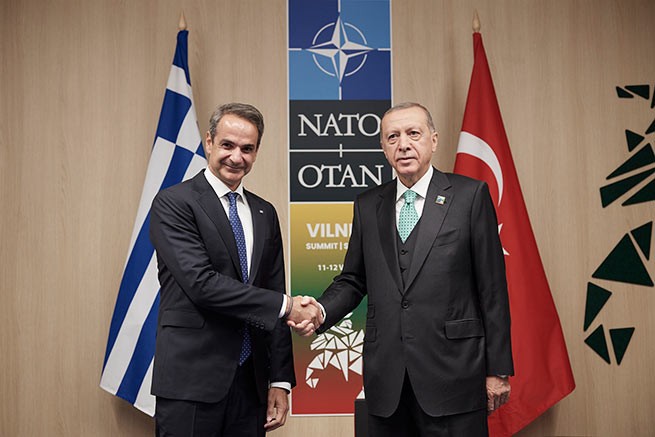No one chooses geographic neighbors. Therefore, it is necessary to find rules for living with them, for example, the following:
Rule one: a country, for example, Greece, must have a high, long-term strategy for relations with a neighbor who often provokes, claims territory and seas. This strategy must combine values and interests. Strive for peaceful coexistence and problem solving when and if possible, but be able to respond to any challenge with all means.
Rule two: Any compromise must be beneficial to both parties. We discuss and, when necessary and possible, negotiate with our neighbour. We never announce concessions or hide them under the rug. Because the other side will take them for granted from the very beginning. And in the future, during the negotiations, it will demand more. From this point of view, the prime minister’s historical mistake of announcing concessions, and even worse, the loss of sovereignty, should not even be brought up for discussion.
Rule three: the general policy option (discussion, negotiation, compromise) is not wrong or right in its general formulation. It becomes such depending on the context in which it is done, on the conditions of its implementation. For example, the transfer of Greek-Turkish disputes to an international court (preferably the Hague) is not in itself bad or good. It is bad if this is done without preconditions and preparation. And here are the mistakes and shortcomings of the current government.
In order for a country to apply to the Hague Court, it must conduct special training. It must study all court decisions and publications of the judiciary, as well as the statements of the judges themselves. But at the same time, she must restore order in her home, for example, close all bays (which gives rise to sovereignty), as well as expand territorial waters to 12 nautical miles in all areas not under diplomatic control. At the same time, the country must open international corridors so that the interests and views of third countries wishing to pass through the seas in which the country exercises sovereignty (and not just sovereign rights, as in the case of the EEZ) are not involved in the issue.
With regard to the EEZ, it can now be taken for granted that the court will take into account the many concessions that the Greek government made in agreeing to all the demands of Italy and Egypt. Concessions that Türkiye will also ask for. Moreover, I consider it likely that an agreement will soon be reached between Egypt and Turkey on their EEZ, which may well include that part of the sea that the Mitsotakis government erroneously believed was not included in the Greco-Egyptian agreement.
Moreover, the prime minister seems to have agreed that Greece will not expand any zone without Turkey’s consent. If this is true, then it means that he has abandoned the line on the absence of a dispute with Turkey outside the EEZ/shelf zone. And this not only officially added an additional dispute, but also gave Turkey the right to vote in other Greek zones, and not only maritime ones.
According to the fourth rule, Turkey must assume obligations to comply with all provisions of international law. Fully accept the jurisdiction and decisions of the International Court of Justice. That is, to sign the International Maritime Law. Otherwise, how can we be sure that she will respect the results of such treatment? Let’s not forget about the constant violations of UN resolutions on the Cyprus issue.
As soon as Türkiye signs the Law of the Sea, it must immediately withdraw the casus belli. After all, how do we get to court? Threatened by? What if she doesn’t like a decision?
Rule five: in an agreement with a neighbor, you cut off any intentions of irredentism. In the case of the Prespa Agreement, North Macedonia from the very beginning renounced all geographic-territorial irredentism and was forced to renounce all “modern” tautological, historical-cultural irredentism as well. In the Prespa Agreement, in paragraph 7 (7), North Macedonia without fail recognized that it and its population had nothing to do with ancient Greek history and Macedonia of Alexander the Great, which was and remains Greek. Unfortunately, in our relations with Turkey, the Prime Minister acted in exactly the opposite way. He announced that our differences would be transferred from the legal to the geopolitical sphere. Thus he brought us back to the irredentism of the nineteenth century.
As a rule, before you see the “good” of negotiations and agreements, you do not refuse, even in words, from your weapons, legal and defensive. The bad thing is that the prime minister agreed to talk about the demilitarization of the Greek islands with 40% of the Cypriot territory under Turkish occupation. Not remembering what happened when the Greek brigade left Cyprus. In this regard, I argue that there are “compromises and compromises.” There are positive, creative, and also ordinary, temporary, breathing compromises, but there are – and everything indicates that we are dealing with one of them here – rotten, deluded.
The seventh rule: do not mix anything with different things to justify unnecessary concessions. The ND party, with the consent of the SYRIZA part, claims that the Prime Minister is preparing an “Aegean Prespes”. Interestingly, if “prespas” were “betrayal”, then how can the prime minister pursue a similar goal in Greek-Turkish relations? But if the Prime Minister now admits that Prespes is a great deal, as he claims at his international meetings, isn’t it time to implement it and the agreements that accompany it? Most importantly, it is an insult to the Prespa agreement to invoke it to justify the government’s poor preparation of a flawed compromise. Let me explain.
First, the Prespa Agreement contains all the conditions for putting an end to irredentism. In the context of the “geopolitical transformation a la Mitsotakis” of Greek-Turkish relations, it not only does not exist, but is reproduced in an expanded form.
Secondly, under the Prespa agreement, Greece undertook to support, and to some extent control and train, the defense mechanisms of its neighbor. On the contrary, what the Prime Minister is preparing involves the disarmament of part of Greece at the request of Turkey.
Thirdly, North Macedonia, as a name and constitutional status, appeared as a result of changes mandatory provided for in the Prespa Agreement, and was made in exchange for facilitating its entry into EU. The question is what exactly will Greece get from Turkey? The prime minister and his staff argue that Turkey’s appeal to the International Court of Justice is a retreat. This is not so, especially without the conditions that I put forward. Moreover, unlike the situation with North Macedonia, the government of the “New Democracy” agreed to the renaming of a large part of the Aegean Sea to Turkestan …
Fourthly, if Greece and North Macedonia made mutually beneficial compromises that benefited both sides, then in what the Prime Minister said, the benefits are largely accumulated in Turkey unilaterally.
The question arises: why is this happening? Could it be because some in government don’t understand the long-term implications for the country and want to please third parties? Maybe, again, because some refuse the option of equal membership in the EU and are preparing to become a small partner of Turkey? Or, finally, for the sake of some business interests?
Mr. Nikos Kotzias is a former Minister of Foreign Affairs.







More Stories
Financial Times: Russia is actively preparing sabotage in Europe
Shock: Drag queen will carry the Olympic flame in Paris
Greece consistently ranks last in the EU for media freedom